by Brian Hioe
語言:
English /// 中文
Photo Credit: Brian Hioe
THE TAIWANESE pro-unification’s left response to the ongoing protests in Hong Kong has been telling. Either one ignores the present events as though protests had not rocked Hong Kong for now close to half a year—one thinks of Coolloud’s sparse coverage of the protests, for one, despite translating and publishing a plethora of articles on recent social movements in Latin America, the Middle East, and elsewhere. Or, worse, some have even seen to fit to lash out at the protests, simply because they challenge the Chinese Communist Party.
In this, members of the Taiwanese pro-unification left reveal that their leftism is hardly leftism at all, but simply a disguise for Chinese nationalism—and that while there are nationalisms both left and right, theirs is a very conservative nationalism, which invariably sides with state power and police brutality against the oppressed.
Self-Proclaimed Leftists Siding with State Violence and the Police
NO EXAMPLE of this seems to be clearer than Ka Wei-bo (卡維波). Ka, ironically a university professor at National Central University, recently attracted the ire of Hong Kong and Taiwanese netizens after the death of 22-year-old student protestor Alex Chow Tsz-lok, who was a second-year student at the Hong Kong University of Science and Technology. Chow died on November 8th after falling from a car park during a police clearance operation, with many suspecting that Chow fell because he was attempting to flee from tear gas fired by the police.
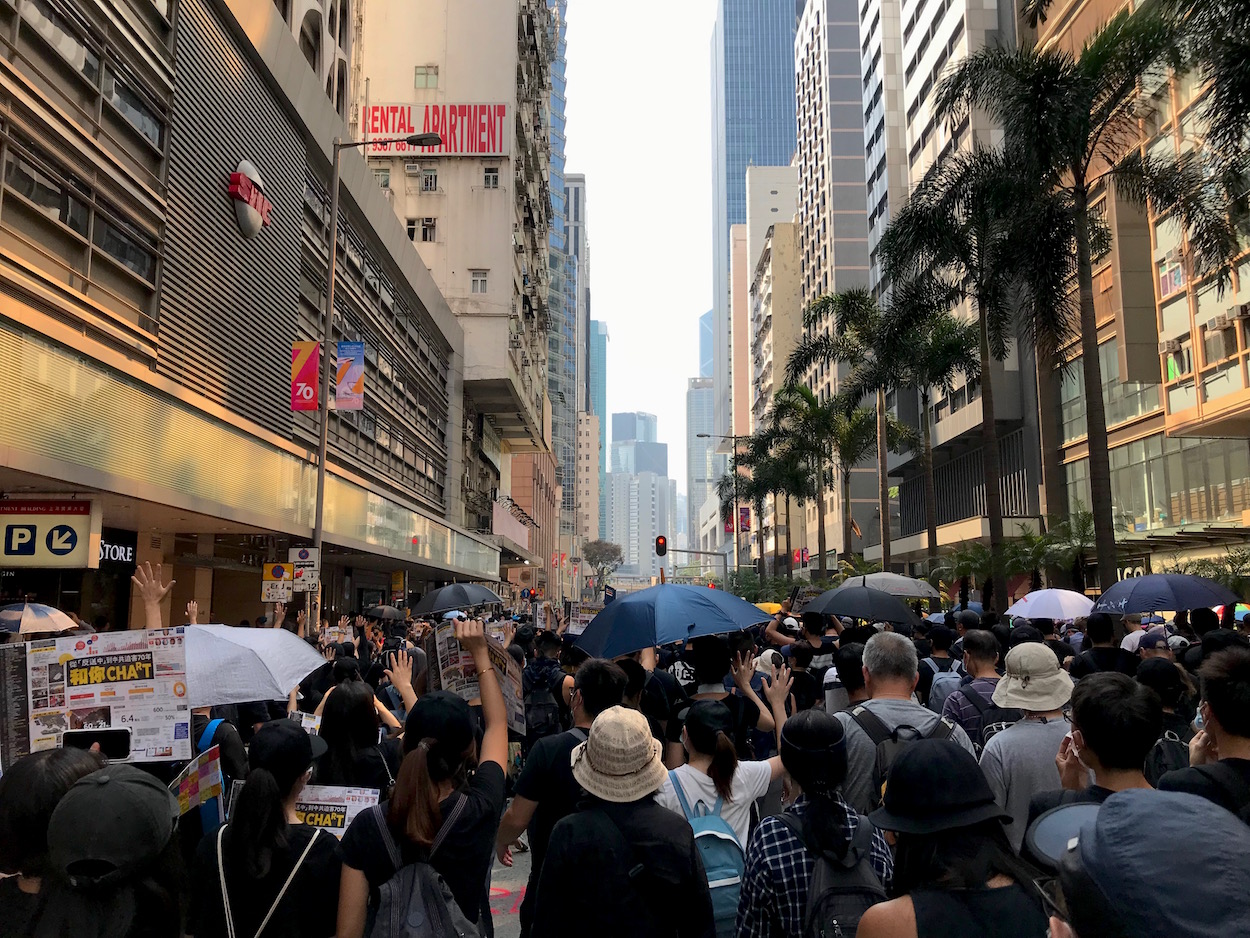 Photo credit: Brian Hioe
Photo credit: Brian Hioe
Ka’s response several days after the death, on November 10th, was to post on the official Facebook account of the Hong Kong Police Force that, “Finally there was a death, there’s no need to protest at the Prince Edward MTR, there’s no need to pay attention to that Haidilao,” (總算真死了一個,不用再去太子站憑弔了,也不用管那個海底撈了), the former referring to a police clearance operation on August 31st in the Prince Edward MTR that some demonstrators suspect may have caused deaths that police covered up and the latter referring the death of a fifteen-year-old protestor whose naked body was found drowned in the Hong Kong Harbor and comparing this to the Chinese-owned hot pot chain which has a location near the Prince Edward MTR. While the circumstances of how this latter protestor died are still unknown, some believe that she may have been secretly killed by the Hong Kong police force, and her body disposed of in Hong Kong Harbor. With regards to Chow’s death, Ka may be interpreted as expressing something like relief, now that there was a confirmed death to the movement, not just speculated deaths.
Ka’s response was rightly called cold-blooded by Hong Kong and Taiwanese netizens. But one also notes the sheer conservatism of a self-proclaimed radical leftist’s response to the death of a young protestor—one young enough to have been a student of his—was to raise the disruption to convenience regarding the shutdown Prince Edward MTR as though this was comparable in any way to the loss of a young life and to make light of the speculated deaths in the Prince Edward MTR crackdown and the drowning death of a fifteen-year-old.
Indeed, a Coolloud article by Ka published on November 4th largely consisting of a rant against “political correctness” suggests that Ka would likely react against critics of his here as enforcing political correctness, something that Ka frames in the article as a product of western liberalism that has made it way to Taiwan and is used to attack individuals such as himself. For Ka—again, a Chinese nationalist more than anything else—anything western is therefore suspect and evil. And, though Ka brings up American conservative reactions against political correctness, Ka seems blind to how his critique of political correctness aligns him with American conservatives in a manner that points to his own drift towards nationalist conservatism. Attacks on the “political correctness” of liberals are, after all, a constant refrain of the contemporary American far-right.
Argumentation by other individuals that can be termed pro-unification leftists has been shallow. An article by Zhang Xiao-hong (張小虹) regarding the deportation of Chinese “tourists” after dismantling a Lennon Wall on the National Taiwan University campus tries to depict the Taiwanese students that set up the Lennon Wall as somehow being the aggressors, in spite of the fact that Lennon Walls in Taipei have been actively dismantled by the Taipei city government and the current administration of NTU leans KMT—as such, attempts to set up Lennon Walls have met with resistance from university authorities.
Indeed, it is not incorrect to ask the question whether deporting Chinese students and “tourists” for defacing a Lennon Wall was a proportionate response, or whether due legal process was followed regarding their rapid deportations. One also notes that the Tsai administration is perfectly happy to spend public expenditure deporting Chinese nationals in what can probably be termed as an election stunt more than anything else, while taking few measures to help Hong Kong asylum seekers in Taiwan—many of which remain in limbo, unable to work or study, and some of which are below the age of eighteen. The Tsai administration may simply be hoping to wait it out in the hopes that these refugees eventually decide to return to Hong Kong on their own.
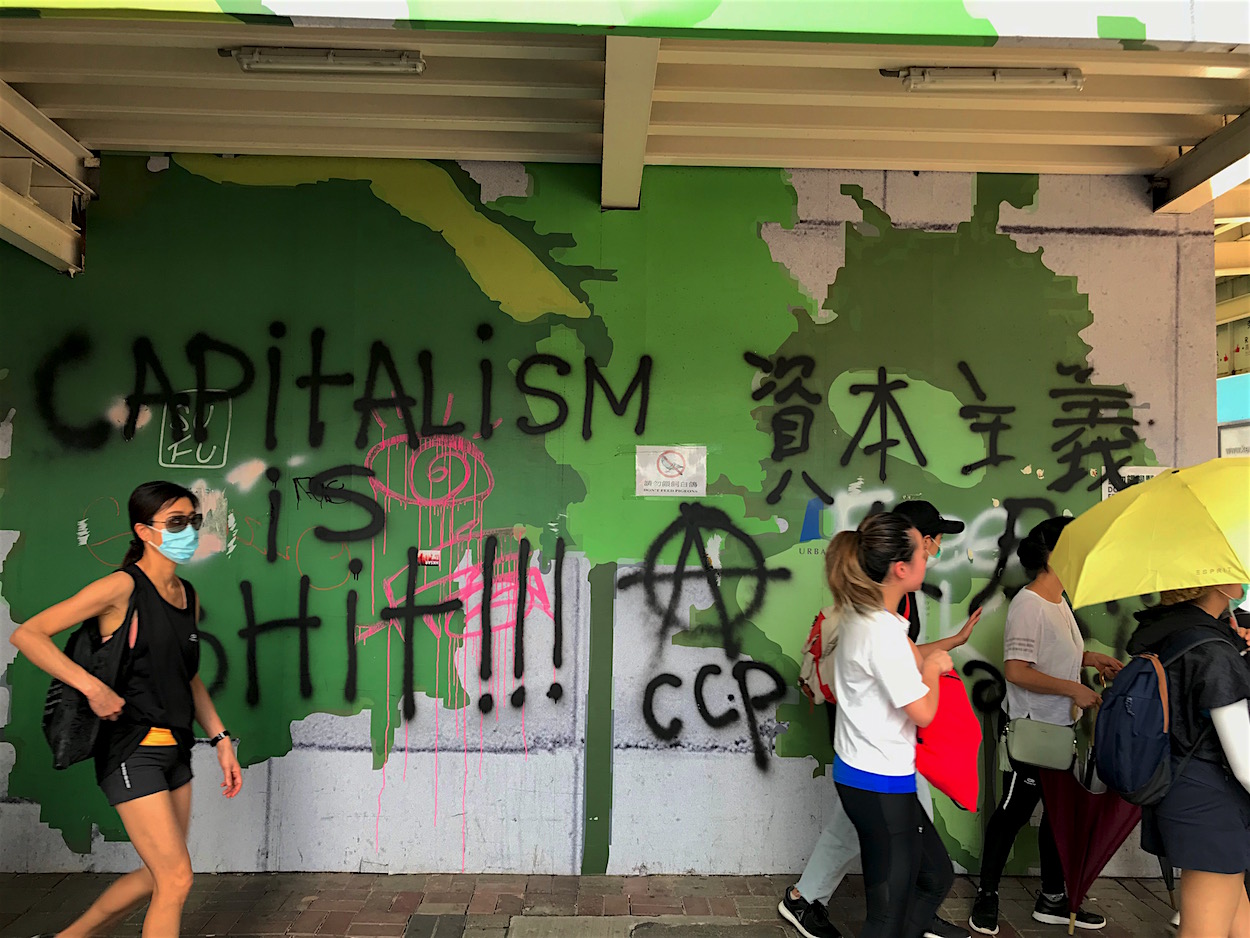 Photo credit: Brian Hioe
Photo credit: Brian Hioe
However, in this case, Zhang sides with the forces of authority against students and, in fact, actually tries to make it as though students were those aggressors in this incident, simply for the act of establishing a Lennon Wall. Zhang also creates a set of false equivalences and misattributes agency in acting as though the students were those with power in this set of circumstances—it is not, after all, the students who decided on the deportation of Chinese simply because they wanted to make a Lennon Wall that was then defaced.
Argumentation from French NCTU professor Alain Brossat in an article published in Storm Media proves similar. Brossat, also a self-proclaimed leftist, bends over to make excuses for the Hong Kong Police Force. Brossat cites the deadly violence used by French police or by Chilean police during the recent protests there in order to claim that the Hong Kong police has been restrained and proportionate in their actions.
And one, too, has seen a defense of the police from Lucifer Hung (洪凌), who recently made comments on Facebook claiming that the siege of Hong Kong Polytechnic University (HKPU) is a false issue. Ironically for someone so fond of lashing out at the imperialist west, Hung attempted to cite conspiratorial western media reports to claim that demonstrators who have been trapped in the university since Sunday, surrounded by police, were free to leave the university at any time—when in reality student have been weathering tear gas and rubber bullets from police for days. Police are also armed with live ammunition. Many of those remaining on campus are injured and it is feared that they will run out of food and water supplies in a few days. Police have been filmed shouting that they wished for another Tiananmen Square Massacre to take place on the HKPU campus, suggesting that police may, in fact, actively hope to have the opportunity to kill the demonstrators trapped on the HKPU campus.
Again, defending the police proves rather strange argumentation from leftists who may otherwise claim to be opposed to the state regulation of sexual and political freedoms. And if the Hong Kong police’s level of violence has not reached the level of, say, conducting mass murders, that does not excuse the Hong Kong police (or any other police force) for their actions either. Ironically, the emergence of the so-called “sixth demand” of the movement, to abolish the Hong Kong Police Force, proves fertile ground for articulating the radical abolitionist demand of a world beyond the institution of the police, but the claim of pro-unification leftists is simply to justify police violence.
Chinese Nationalism Undergirds the Argumentation of Pro-Unification Leftists
BROSSAT’S ARGUMENTATION, as well as that of other pro-unification leftists also attempts to point toward shortcomings of the movement as though this were delegitimizing of the movement as a whole. Brossat points out the movement’s appeals to western powers to claim that the current movement is right-wing, as a separatist movement, and equates the movement to support for right-wing authoritarians as Donald Trump despite the movement’s own claims to be advocating for democracy.
A few days after criticisms of Ka for his comments on Alex Chow’s death, on November 13th, Ka’s response seems to have been to repost on Facebook an article of his dating from 2013 and then on November 16th to publish the text of a 2016 talk given at Peking University that was later published as a paper in 2018. This offers similar argumentation in which he claims that any push toward Hong Kong self-determination is the result of internalized Cold War ideology regarding western notions of liberalism and democracy, are inherently anti-Chinese on the basis of viewing Chinese as uncivilized, and feeds into a clash of civilizational discourse. Any discussion of not just western, but also Chinese imperialism is simply construed as a failure to grasp the possibility of coexistence between Chinese and western modernity—both of which are framed in rather monolithic terms.
Ka’s comments on Facebook are probably more revealing of his true views, rather than what is dressed up in intellectualism. However, whether with Brossat or Ka, the argumentation of both simply is that the movement in Hong Kong is anti-Chinese. But in truth, the underlying logic of both is a romanticized, nostalgic view of China in which China is inherently and essentially equated with leftism, leading a view of the movement in Hong Kong necessarily as right-wing—never mind the millions of workers toiling in oppressive conditions in contemporary China or the history of leftist concepts of self-determination in the Marxist traditions that they often cite, such as Leninism or Trotskyism.
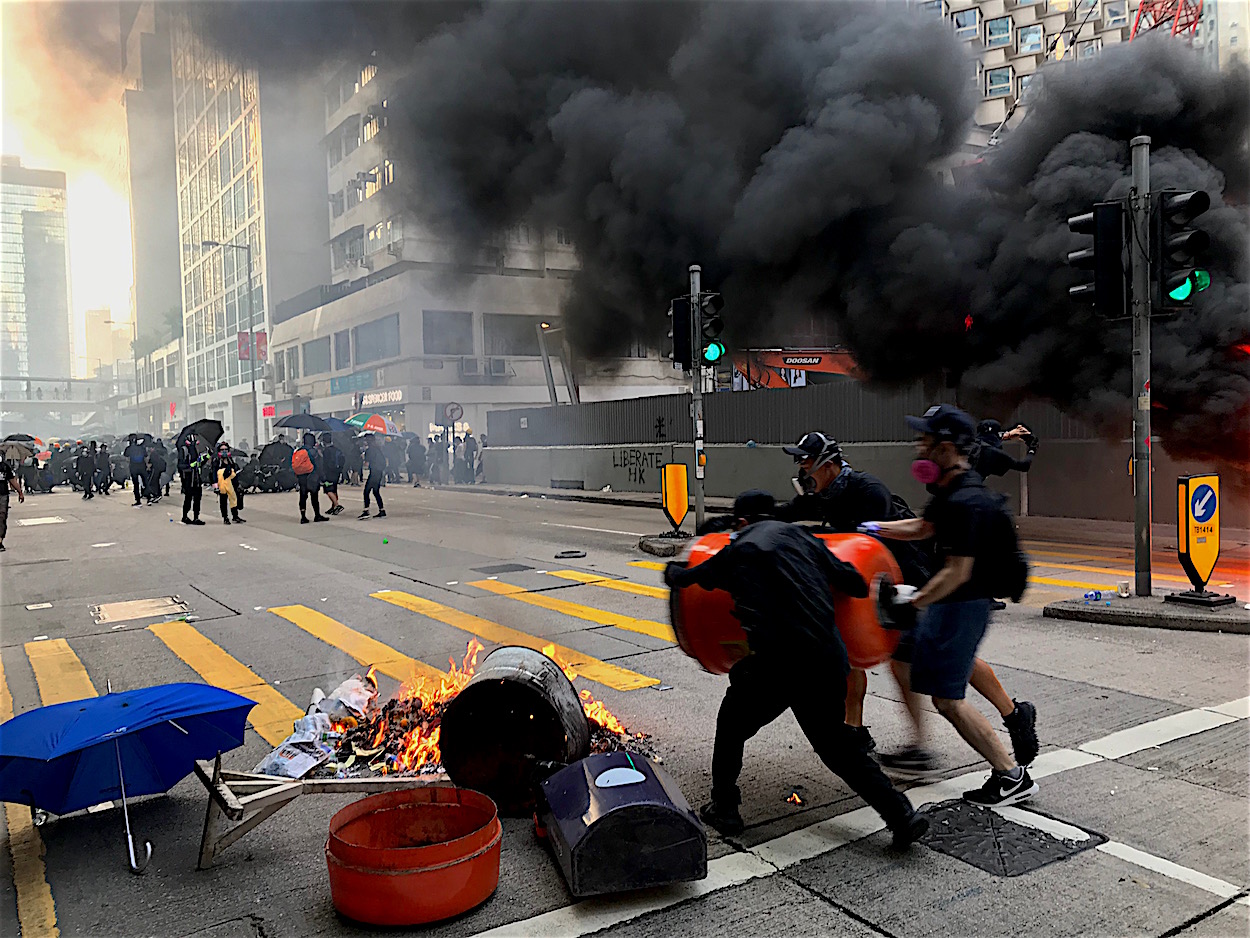 Photo credit: Brian Hioe
Photo credit: Brian Hioe
Indeed, much as Taiwanese pro-independence groups have become highly sympathetic to events in Hong Kong, seeing Hong Kong as in some way representing a potential future for Taiwan and in that way projecting Taiwan onto Hong Kong, the Taiwanese pro-unification left also no doubt is projecting Taiwan onto Hong Kong, seeing a mass uprising against Chinese authoritarianism in Hong Kong and this touching upon their fears in Taiwan.
Both Brossat and Ka’s logic is notable in, firstly, simply trotting out various leftist thought-taboos in the services of trying to defame contemporary Hong Kong social movements and, secondly, not actually presenting an accurate picture of the movement. Thirdly and most importantly, both lines of argumentation are damaging to the potential for a left intervention in the current protests, which is why there is utility in criticizing the fringe views of pro-unification leftists.
A Failed Opportunity to Disillusion Individuals of Imperial Nostalgia and the Romanticization of Western Imperialism
CERTAINLY THERE have been appeals to western powers to intervene in Hong Kong, as one observes in American and British flags seen during protests. With British flags seen in protests or attempts by movement activists to appeal to the British government, one observes a certain amount of imperial nostalgia.
However, one notes that imperial nostalgia is far from unique to Hong Kong. When a second colonizing force enters a country or territory and seems worse than the previous colonial force, then that previous colonial force becomes seen in a nostalgic light. One sees this in Taiwan with the nostalgic view of the Japanese colonial period after the KMT came to Taiwan, overwriting the killings and purges conducted by Japanese colonial authorities and the memory of anti-colonial uprisings against the Japanese.
Appeals to the West by protestors in Hongkongers—or, for that matter, Taiwanese—represents naivete more than anything else. Hongkongers and Taiwanese have, in many cases, failed to see the brutal underbelly of American imperialism, failing to understand that America’s only concern with Hong Kong and Taiwan is as a wedge issue against China and that Hong Kong and Taiwan are liable to abandonment if they ever became a liability.
America’s sudden derecognition of the Republic of China in favor of the People’s Republic of China in the 1970s would be the first and most obvious example where Taiwan is concerned. It is a failure of historical memory that more in Taiwan do not keep this event in firmly mind in any and all dealings with America, regarding the possibility of Taiwan possibly being suddenly abandoned by America.
On the other hand, with Hong Kong and the British, one notes that the British only began to introduce democratic reforms into Hong Kong in the years prior to the 1997 Handover. This was largely because the British government—which was in the process of dismantling the vestiges of the British empire at the time—felt it had to take some sort of measure to save face in the wake of the Tiananmen Square Massacre so that it was not perceived as abandoning Hong Kong to China.
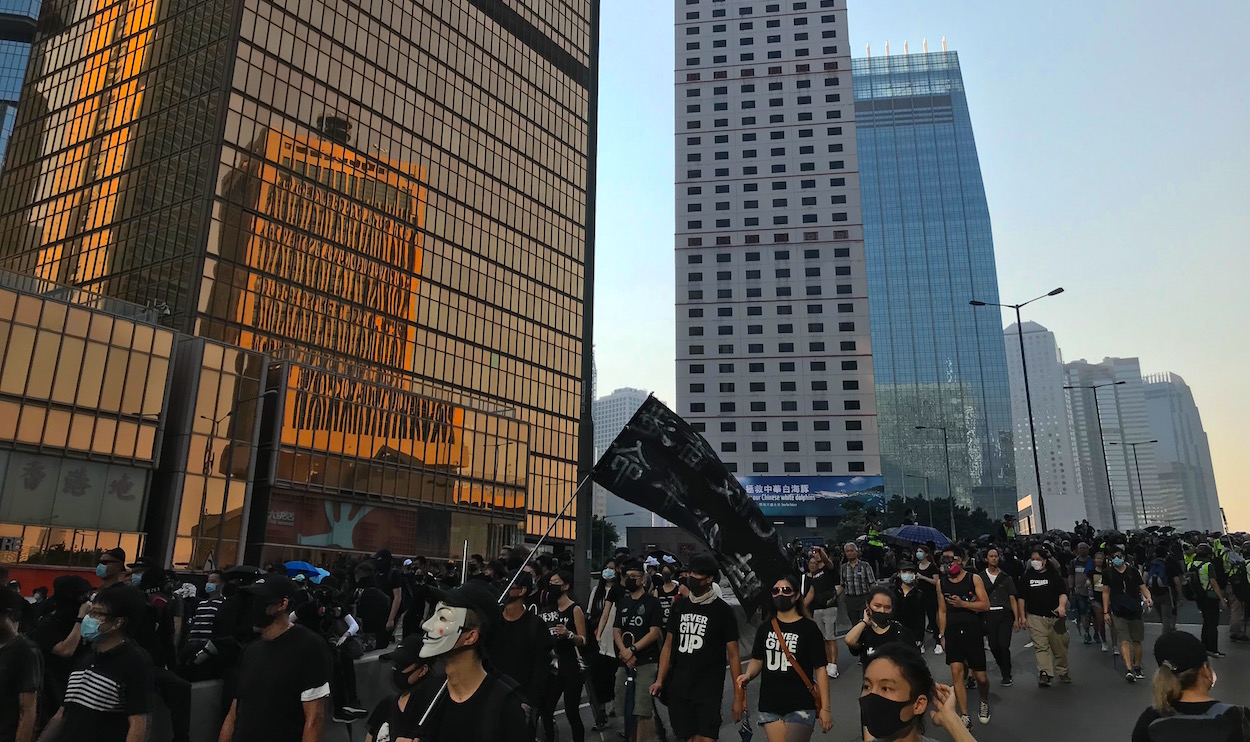 Photo credit: Brian Hioe
Photo credit: Brian Hioe
To this extent, the present protests in Hong Kong actually prove a strong opportunity for leftists to intervene and to disillusion both Taiwanese and Hongkongers’ of their rose-tinted views of America and other western powers. The Trump administration has stated openly that it is willing to take Hong Kong off the table in trade negotiations with Chinese President Xi Jinping, with Trump referring to Hong Kong as an internal matter for China to handle and the protests there as “riots”. Hong Kong is, quite clearly, simply a chess piece for America in geopolitical contestation with China, as is Taiwan.
For American politicians, Hong Kong and Taiwan have provided opportunities to pass legal agreements aimed at sanctioning Chinese political elites, or otherwise signaling stronger support. But if it is in the greater economic and political interest of America to abandon support for Hong Kong and Taiwan, this reversal would take place very quickly, as it has in the past.
With the protest slogan “Restore Hong Kong, Revolution of Our Times” (光復香港,時代革命)—one notes the term “Restore” (光復) actually has resonances with KMT discourse regarding “Restoring” political control of the Chinese mainland. But there is no prior utopian order to be restored in Hong Kong or, for that matter, anywhere else. Rather, the present protests will have to create this utopia in and of itself—through revolution in the neoliberal city, a place of some of the world’s most unequal economic conditions. This is where the leftist potentials of the movement lie.
This is what Ka and Brossat ignore because of their greater Chinese nationalism, instead simply further entrenching the view of leftism in Hong Kong and Taiwan which has the left equated with China. Overall, this is a phenomenon that has led to individuals who could be won over to leftism declaring themselves to be part of the political right instead. In the case of Ka, he makes such arguments simply because of his own ethno-nationalist longing for China, and in the case of Brossat, this is Orientalist nostalgia for Maoist China coming from a westerner that does not seem to understand Mandarin, Cantonese, or Taiwanese Hoklo.
Attempts to Create Misleading Impressions of the Movement
TO BE SURE, there are other elements in which the present movement has flaws worthy of critique. Brossat rightly points that the movement’s appeals to migrant workers have been limited and that the movement has, in some cases, led to assaults on Chinese.
But firstly, the overall aggression against protesters by police and pro-Chinese triad groups is much higher than any reactions by protesters against individuals they deem to be Chinese. And, though this could also be improved upon, the movement has made large-scale efforts aimed at outreach to Chinese, such as conducting protests in areas close to the Chinese border or in which there are a large number of Chinese tourists.
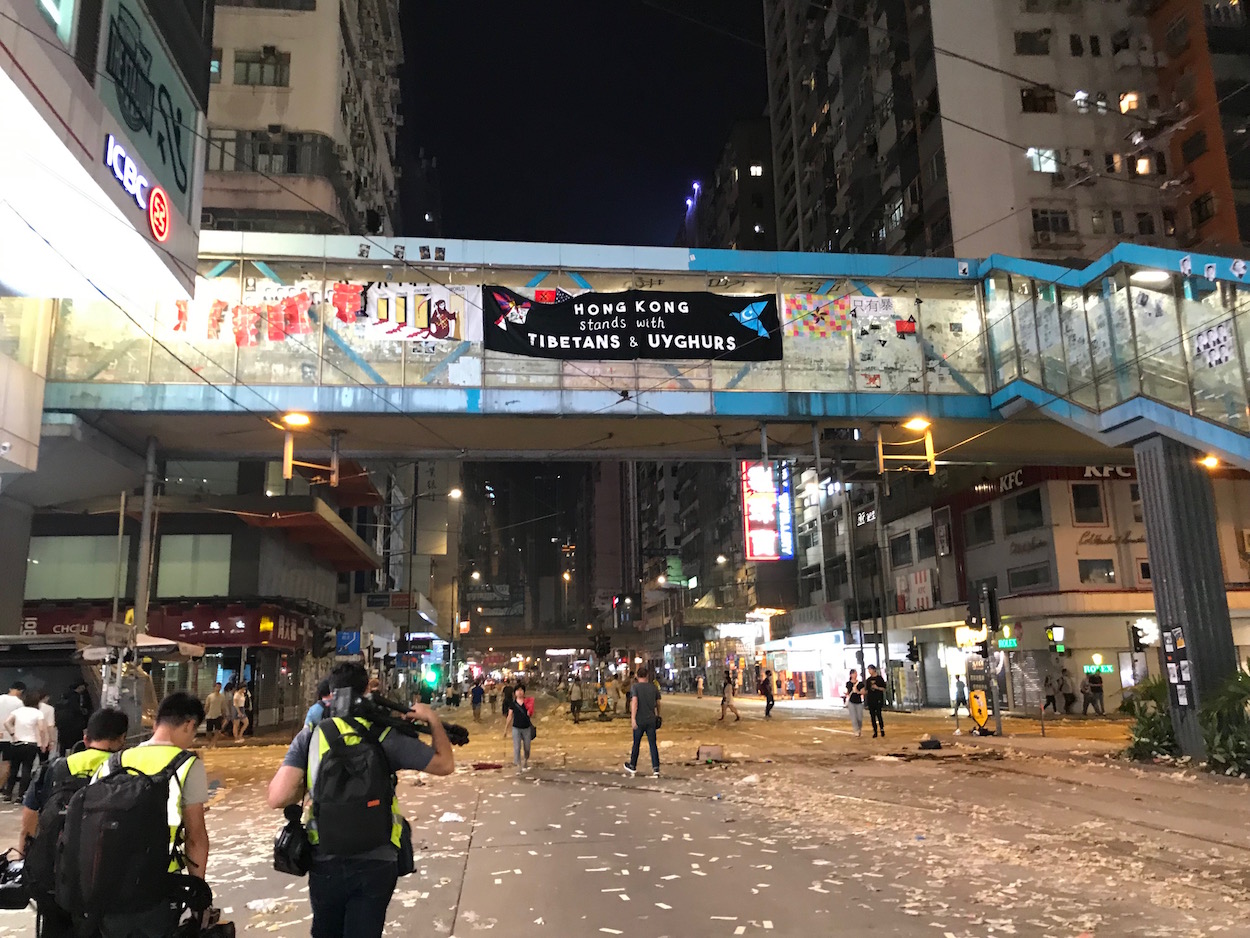 Photo credit: Brian Hioe
Photo credit: Brian Hioe
One has observed waves of Chinese support for the movement, as illustrated in Chinese posting pictures of their passports with messages of support for the movement, finding ways to post protest slogans on highly-regulated Chinese social media, and expressing support in secretive Telegram groups. This has also occurred in the form of traveling to Hong Kong to observe the events in Hong Kong for themselves, something which has already led to the arrest of at least a dozen or so Chinese. Ka and Brossat deliberately pass over this in their argumentation.
It is true that the movement still has many steps to take if it hopes to be more inclusive of migrant workers, despite that migrant worker participation in the movement could be a game-changer for the movement.
But migrant workers can frequently be sighted cheering on demonstrators when they pass by migrant worker gatherings, particularly if demonstrations take place on Sundays—oftentimes the only day that migrant workers have off in Hong Kong. And with southeast Asian residents of Hong Kong an increasingly visible presence in protests and attacks by the Hong Kong police on Muslim religious centers, the movement has attempted to be more inclusive to minorities by putting greater priorities on messaging in English. There have also been a number of events aimed at demonstrating solidarity between southeast Asian residents of Hong Kong and the ethnic Han majority.
In all probability, Brossat, Ka, and others have not traveled to Hong Kong to observe the protests and are simply casting armchair aspersions from afar—another illustration of how remote from contemporary social movements that a group of intellectuals that first began to be known from participating in street protests has become. And it is ironic, of course, for individuals who are researchers of social movements to be making up false claims about social movements.
One observes a general tendency by pro-unification leftists to make up claims about movements that, in all probability, they have never been visited in Zhao Gang’s claim that “Taiwanese independence and anti-Communist slogans” (“到處是台獨反共標語”). were everywhere on signs during the Sunflower Movement. Indeed, apart from that I saw none during the 23 days of the Sunflower Movement, after sorting through and categorizing thousands of images of signs and artwork from the movement in order to produce a 400,000-word online history archive of the movement, I only saw a few signs with explicitly anti-Communist slogans.
Conclusion: A Rightward Turn by the Pro-Unification Left?
THE BANKRUPTCY of the Taiwanese pro-unification Left should be clear then, in its responses to the current protests in Hong Kong. Despite often militating against what is claimed to be state regulation of political and sexual freedoms, the pro-unification Left cheers on the Hong Kong Police Force’s many acts of brutal violence against demonstrators—inclusive of deadly force, sexual assault, and what some suspect to be secret killings. This is simply because the Hong Kong Police Force acts to defend the authority of the CCP.
And intellectual argumentation by the pro-unification Left that attempts to deconstruct the demands for political freedoms of Hongkongers is based upon establishing a misleading view of the movement. This is one that forecloses the potential for leftist interventions in the movement. Whatever pro-unification leftists claim, their political views regarding leftism are simply aimed at justifying the exercise and expansion of Chinese sovereign—which is to say imperial—power.
 Photo credit: Brian Hioe
Photo credit: Brian Hioe
Generally speaking, these are individuals who once may have played a leading role in Taiwanese social movements but now, after having become institutionalized as academic elites at prestigious institutions, they seem to attack contemporary social movements out of some notion of ressentiment at younger activists of the current generation. Sometimes this simply strikes as jealousy because of a deeply internalized sense of growing political marginalization and irrelevancy.
One wonders if their contemporary views will eventually come to overshadow their past accomplishments. Yet, frankly speaking, the slide of individuals who were leftists in their youth to later becoming members of the far-right in a reaction to a younger group of activists is something far from unheard of. One thinks of the American neoconservatives, for example, who began as leftists but became increasingly conservative as a reaction to the rise of the New Left. This would be much as how pro-unification leftists as Ka seem to have shifted rightward politically in reaction to younger Taiwanese activists.
The slide of such individuals toward irrelevancy seems irreversible—and this will likely ultimately be to the benefit of the Taiwanese and international left. Perhaps the sooner the better.

